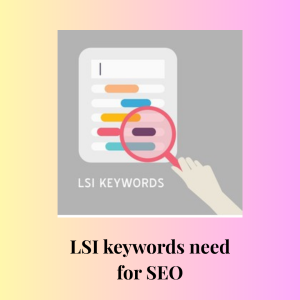
LSI keywords are related terms to primary keywords that offers meaningful value and contextual depth. In the ever-evolving landscape of Search Engine Optimization (SEO), content quality and contextual relevance have become more important than ever. Gone are the days when keyword stuffing could help a web page rank on the first page of search results. This is where Latent semantic intent keywords come into play. These keywords help enrich content, improve relevance, and signal to search engines that your page is genuinely about a specific topic. But what exactly are Latent semantic intent keywords, and why are they essential in modern SEO? Let’s dive in.
What are LSI Keywords and Why are They Needed for SEO
LSI keywords, short for Latent Semantic Indexing keywords, are terms and phrases that are semantically related to the primary keyword. They aren’t synonyms necessarily, but they are contextually linked words that search engines use to better understand the theme of your content.
For example, if your main keyword is “Apple,” LSI keywords might include “iPhone,” “MacBook,” “iOS,” or “Steve Jobs” when writing about the tech company. Alternatively, if your article is about the best restaurants, related keywords could be “Top restaurants,” “leading restaurants,” or “reputed hotels.” These related terms help search engines understand that alternate keyword is focused to avoid competition and generate maximum traffic which it ranks for that keyword.
LSI Keywords VS Common keywords
Contextual relevance
- LSI keywords are closely related in meaning and topic to the primary keyword. Whereas Common keywords are typically the main keywords repeated throughout the content in similar terms.
- Examples: If the main keyword is “real estate,” LSI keywords could be “property listings,” “mortgage,” “home loan,” “broker,” etc. which avoids using similar keywords making content meaning stronger but in common keywords repeating “real estate” 20 times on a page is considered common keyword usage where there is no related term for it.
Semantic depth
- They help search engines understand the subject matter of your content on a deeper level but for common keywords They don’t add contextual value on their own and deeper understanding about intent of content.
Natural usage
- They improve readability by avoiding repetitive use of the main keyword but for common keyword overusing them can hurt SEO performance being similar terms that may irritate the users and signal google to consider as poor user experience.
Why Are LSI Keywords Needed for SEO?
Improves Content Relevance
LSI keywords help define the context of your content, making it more relevant to what the user is searching for as applying different keywords as “top”,” best” help to generate meaning of content effectively.
Prevents Keyword Stuffing
Instead of repeating the main keyword excessively, you can use related phrases to make your content more natural and user-friendly as instead of applying “best hotels” frequently in content “Top hotel” suit more to avoid excessive keyword stuffing.
Enhances User Experience
Content enriched with LSI keywords reads more smoothly and offers in-depth coverage of the topic. As for content with title” Best hotels Near me” can be optimized with related terms as “Top 10 hotels near me” or more to provide in-depth intent of content
Better Search Engine Understanding
Search engines like Google use semantic indexing to understand user intent. LSI keywords support that understanding and help improve ranking as Google directs to user through LSI keywords for its primary keyword and navigate to your content.
Boosts Long-Tail Keyword Rankings
Many keywords are long-tail in nature or closely related to long-tail searches. Incorporating them helps you capture a wider range of search queries. As audience if focus on “Best Builders “then other audience may opt for “Top Builders” where intent is similar for both of them. Hence optimizing for such related keywords can avoid missing target audience with similar intent.
Steps to Implement LSI Keywords in SEO Content
Step 1: Identify Your Main Keyword
Start by defining your primary keyword. This will guide your content theme and help you generate relevant LSI keywords around it.
Example:
Main keyword: “Digital Marketing”
Step 2: Research LSI Keywords
For “Digital Marketing”, LSI keywords might include:
- online marketing
- SEO
- social media marketing
- email campaigns
- content strategy
- Use tools like Graph, Google Autocomplete, Google’s “Searches related to” section or SEMrush, Uber suggest, AHREFS, or Moz
Step 3: Plan Your Content Outline
Map your keywords to different sections of your content. This ensures even distribution and avoids over-optimization. Optimize keywords in even subheadings and pointers and limit up to adding 25 times.
Step 4: Use LSI Keywords Naturally
Add LSI keywords into
- Headings and subheadings
- Image alt texts
- Meta descriptions
- Paragraphs
- Anchor texts for internal linking
Avoid forcing them unnaturally, as that may hurt readability and user experience.
Step 5: Optimize for User Intent
Make sure your content answers the questions or intent behind the main keyword and its related terms. Include FAQs and definitions when needed. Suppose content is about best Top 10 agencies then add answers based for leading agencies that specify right intent with related keyword.
Step 6: Monitor Performance
After publishing, use tools like Google Search Console or SEMrush to analyze how your content performs for related keywords. You may discover new LSI opportunities for future optimization for high performing keywords
Conclusion
LSI keywords are no longer optional in a world where Google emphasizes user intent, semantic understanding, and contextual relevance. They play a vital role in shaping high-quality content that ranks well, provides value, and keeps readers engaged. By understanding what related keywords are and how they benefit SEO, you can craft content that is not just search engine-friendly but also genuinely useful to your audience.
Integrate LSI keywords smartly, write for your users, and you’ll be rewarded with better rankings, more traffic, and stronger user engagement. Start implementing this strategy today, and future-proof your content in the competitive world of SEO. Hence to Know more partner with SEO Agency in Dubai Osumare.

